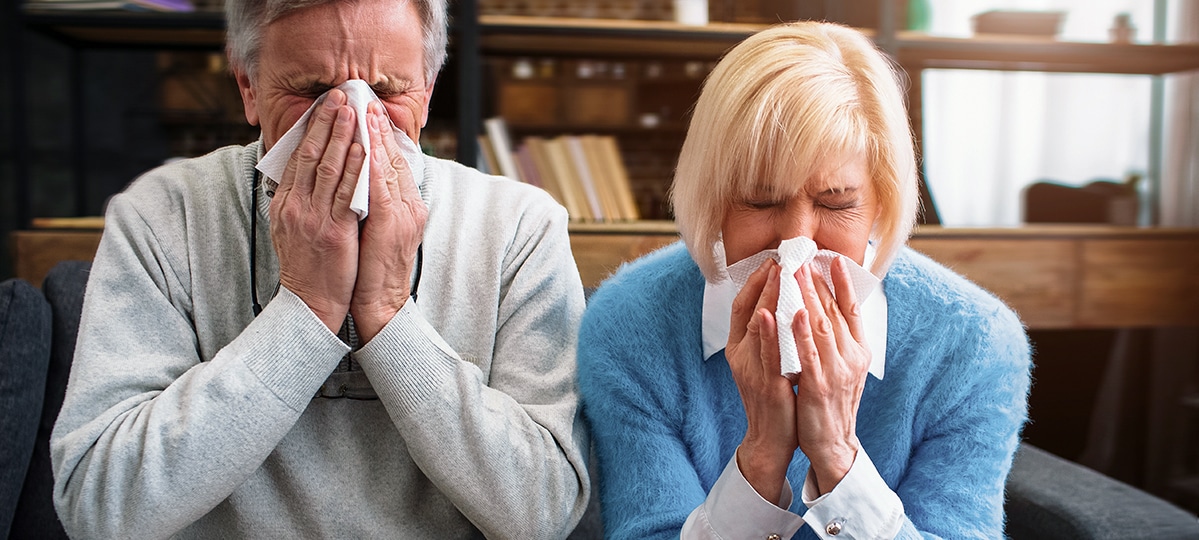The flu can affect persons of any age. In fact, young children and adults over the age of 65 are at most risk for developing complications related to the flu. The Centers for Disease Control (CDC) estimates that 80 percent of flu-related deaths occur in adults over the age of 65.
Flu season generally peaks in mid-March. It is important to take precautions to prevent the flu, such as getting a flu shot. It is also important to understand and recognize the difference between the common cold and influenza. If you suspect you may have the flu, it is always recommended that you seek advice from your doctor.
Cold vs. Flu Symptoms
It can be difficult to tell whether you have a cold or the flu, as both have some overlapping symptoms. These are both viruses that affect the upper respiratory tract. However, symptoms of the flu can be worse than a cold and impact other parts of your body. The flu can also last longer than a cold and can progress to a more serious bacterial infection, such as pneumonia if not addressed early on.
Common Cold Symptoms
- Gradual onset of symptoms
- Sore throat
- Congestion and runny nose
- Sneezing
- Moderate cough
- Mild muscle aches
- Tiredness
Common Flu Symptoms
- Acute onset of symptoms
- Fever
- Chills
- Fatigue
- Headache
- Cough with chest discomfort
- Muscle Aches
- Mild sore throat
- Mild congestion
- Mild sneezing
As you can see, the flu presents with more symptoms than a cold. It can be very uncomfortable and force you to stay in bed for a few days. A cold may last a couple of days and up to a week. The flu generally takes a week and up to two weeks to recover from.
Flu Treatment
If you think you have the flu, it is best to see your doctor within 48 hours of becoming ill. He or she might prescribe an antiviral medication that is most effective when taken at the onset of symptoms. If necessary, use your Medical Alert system to notify someone that you are feeling ill.
Aside from antiviral medications, it is very important to get bed rest and stay hydrated with plenty of pure water. NSAIDS, such as acetaminophen and ibuprofen, may help with fever, headache and body aches. Wash your hands, bed linens and clothing often to minimize the spread of the virus and bacteria. Most importantly, do not go to work or activities where you might be exposed to more germs when your immune system is already compromised. You also don’t want to give anyone else the flu.
Flu Prevention
Older adults can do several things to ward off catching influenza. The first line of defense is getting a seasonal flu vaccine in the form of an injection or a nasal spray. Insurance will generally cover the cost. The vaccine can protect you from a variety of flu strains. It is estimated that the vaccine can reduce your risk of getting the flu by 50 percent. High-dose vaccines are often administered to those at greater risk. Pneumonia vaccines are also recommended for older adults.
You can strengthen your immune system to help you stay healthy and have a better ability to recover from the flu. Eat a nutrient-dense diet of fresh fruits, vegetables, and lean protein. Be sure to get adequate sleep daily. Exercise on a regular basis, especially in the fresh air. Take a multi-vitamin if recommended by your health care provider. Take time to connect with loved ones and minimize stress.
Having a clean environment discourages the growth of viruses and bacteria. This includes your home and office. If possible, wipe down surfaces with anti-bacterial solutions or wipes. Don’t forget light switches and doorknobs that others are touching.
If you have to be around others who might be sick with the flu, don’t be shy about wearing a mask and gloves. Airplanes, subways and hospitals are especially germy spaces during the season.
Bottom Line
Flu season is still going strong and will peak in March. If you haven’t gotten a flu shot, there is still time to do so. If you do come down with the flu, be sure to contact your doctor within 48 hours of symptoms onset, even if it just turns out to be a common cold. Put practices in place to prevent the flu. If you are over 65, it is important to take precautions so that complications don’t develop that could result in a more serious illness.




